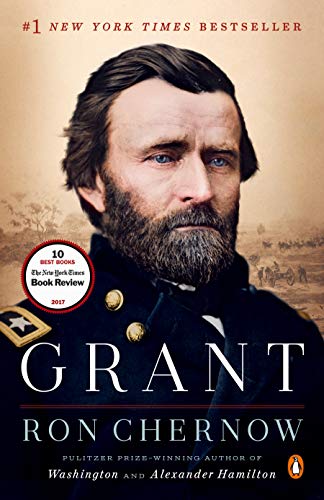 Reddit reviews Grant
Reddit reviews Grant
We found 2 Reddit comments about Grant. Here are the top ones, ranked by their Reddit score.

The definitive biography, Grant is a grand synthesis of painstaking research and literary brilliance that makes sense of all sides of Grant's life, explaining how this simple Midwesterner could at once be so ordinary and so extraordinary.
As mentioned by the other commenter, a lot of his drinking stories were told by his rivals or enemies during and after the War. McClellan in particular kept the rumor of Grant's drinking alive as Grant's victories in the West kept stacking up and McClellan was... uh... "struggling" in the East.
However, the modern view* is that the issue wasn't that Grant drank all the time, rather that when he did, he binged and basically blacked out. There were plenty of commanding officers that were literally drunk during battle, so it seems to me that at the time, the bigger taboo was being a lightweight. Most of this stemmed back to his days as a young officer stationed up in bumble fuck Oregon, where he was caught manning the payroll table while drunk. A young fellow officer, George McClellan, was visiting base that day and never forgot. Rather than accept a punishment, Grant resigned from the Army. This overreaction on his part led many to believe that it was more than just being tipsy at his desk (my take is that he missed his family dearly and this was the first half-decent reason to leave the Army and head home).
At one point during the Civil War, Lincoln sent someone to keep tabs on him because of the pervasive rumors. That reporter ended up being one of Grant's biggest defenders. By most accounts, when Grant did drink, it was during periods of extended inaction, he got shitfaced, but was up early the next morning without a hint of hangover. No one close to him ever reported (publicly or privately, including diary entries) that Grant had drank prior to or during any moment of importance during the war.
*My view on this is shaped by 3 biographies written in the last 10-15 years by excellent, objective historians: Jean Edward Smith, H.W. Brands, and Ron Chernow. I highly recommend any of them (or all of them if you're a nerd like me...).
Well, Ulysses S Grant's brutal strategy ended a war that had killed around a 20th of the US population, ended slavery, and kept the entirety of the south under US control and while he was president tried much harder than any other president afterwards (until the Civil Rights movement) to ensure the rights of African-Americans. I would read A Life of Ulysses S Grant and Ron Chernow's Grant to understand the more positive view of him being developed by current historians.
Genghis Khan is interesting, his penchant for rape and murder is well known, however he was able to unify the previously desperate mongol tribes into an army and eventually an empire that conquered: China, Russia (in the winter because screw everyone else who tried), Central Asia, and parts of the Middle East. Genghis' empire ultimately improved trade across Eurasia, his bureaucracy was strong and his movement of skilled people to where they were needed is considered a pretty smart move. The mongols were also very culturally tolerant this is why Han Chinese, Muslims, and others could all live under his rule. So basically awesome empire, not so awesome conquering of empire.
Other guys are harder to defend but I will say for Georgy Zhukov and Douglas MacArthur that they developed working strategies for defeating an ideology that could have very well changed the way life is in our time. Also MacArthur basically turned Japan into a democracy and helped end the fanaticism there that helped cause WW2 in the first place.
How you view historical figures and whether you see them as heroes depends a lot on perspective and your values. The Hague and great deal of the world's humans see human rights as an important part of their values today and will attach a great deal of negativity to the actions of many of the figures mentioned above. However evaluating these figures just by human rights I think ignores a great deal of nuance in their actions and their improvements to the human condition. What I also try to remember nowadays is that heroism and progress doesn't negate violence and terror, but violence and terror don't negate heroism and progress and ultimately we have to each, for ourselves, evaluate historical figures based on what we believe in.